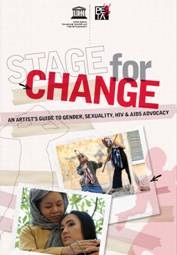PETA Mekong, UNESCO unveil guide on theater and social advocacy

In 2006, PETA partnered with the United Nations Educational, Scientific and Cultural Organizations or UNESCO. The partnership resulted in a collaborative effort between PETA and UNESCO to produce a guide on how issues such as gender and HIV/AIDS can be transformed into a performance piece.
Stage for Change – An Artist’s Guide to Gender, Sexuality, HIV & AIDS Advocacy is a 147-page manual. It provides information on HIV & AIDS in Mekong and how gender and sexuality issues play a role in its spread in the region. The guide also teaches about story building and how to devise advocacy performance pieces.
The guide was written by Lea L. Espallardo, director of the PETA Mekong Partnership Program; Emma Rose Quesada-Medina, PETA Senior Resident Artist-Teacher; and Rodolfo C. Vera, PETA Senior Resident Artist-Teacher.
The manual is available in electronic format and can be downloaded from the UNESCO site.